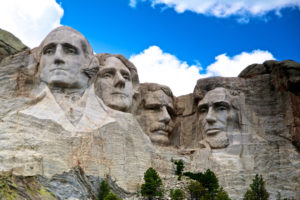Finding True Personal Freedom
(Guest post from my good friend Isaac Vogel)
Do you ever find yourself wanting to find personal freedom from the pressures and challenges of life but don’t know where to go?
This past fall, our family made the pilgrimage west to South Dakota, aptly dubbed a state of “Great Faces, Great Places” in homage, of course, to the iconic tourist destination Mount Rushmore. We set out in search of some personal freedom from the demands of everyday life. While I grew up in South Dakota and have visited Mount Rushmore numerous times, this trip marked a formative shift in my perspective—and in my appreciation for this colossal human feat.
 Although I remember marveling at the enormity of the four mythical faces when I visited Mount Rushmore as a child, I didn’t know much about its background. Mostly, the experience confirmed that I was in the presence of something far greater in stature than me. When I returned this past fall, I realized this was as much a metaphorical sentiment as it was a literal one.
Although I remember marveling at the enormity of the four mythical faces when I visited Mount Rushmore as a child, I didn’t know much about its background. Mostly, the experience confirmed that I was in the presence of something far greater in stature than me. When I returned this past fall, I realized this was as much a metaphorical sentiment as it was a literal one.
Conceived of by Doane Robinson and Gutzon Borglum to promote tourism in the area, Mount Rushmore took 14 years to complete. More than 400 workers were involved over that span of time, and they removed more than 410,000 tons of rock, primarily by dynamite.
The notion of carving four heads sixty feet high into the side of a mountain, by way of explosives no less, is absolutely preposterous. Not only that, the work was dangerous, tedious, and likely offered very little in the way of instant gratification.
So, what on earth compelled these men to see it through?
The Pursuit of Something Bigger Than Ourselves
As we made the long journey back home to Minnesota, it occurred to me that the workers’ dedication to a seemingly impossible plan might have come from the fact that they knew they were pursuing something much bigger than themselves.
No doubt the permanence of granite served as a perfect medium for Borglum to convey the ideals that had come to characterize the very essence of being American. It provided a canvas to create something that could stand forever as a symbol of the “birth, growth, development, and preservation of the United States,” according to the National Park Foundation. These lofty ideals clearly drove them to persevere, even though at times the goal seemed impossible, illogical, and downright crazy.
Thanks to their unwavering commitment, Mount Rushmore today welcomes more than two million visitors a year. I wonder how many others feel the same way I did—the connection to a history, a legacy, and an idealism of freedom much bigger than themselves? And I wonder, if we took the time to stay connected to this mindset, how it would impact our work? Our relationships? Our spirituality? Our life?
In the book, “The Denial of Death,” Ernest Becker writes, “Once the person begins to look to his relationship to the Ultimate Power, to infinitude, and to refashion his links from those around him to that Ultimate Power, he opens up to himself the horizon of unlimited possibility, of real freedom.”
Too often, we travel down misguided paths in pursuit of personal freedom. We want “financial freedom” or “the freedom to choose” or “the freedom to do what we want to do.” And while there is perhaps no greater symbol of “freedom” than Mount Rushmore, I find it telling that it exists only because of the sacrifice, dedication, and vision of people embracing and connecting to a much more evolved and enlightened notion of freedom: freedom from ourselves.
Finding Freedom in the Mundane
Sometimes it takes a hulking monument to be reminded of this true personal freedom. Sometimes you have to detonate a little dynamite. Sometimes you need to commune with a God you can’t touch or feel. In between these profound moments, however, are hundreds of thousands of more mundane moments where it’s more fun, easier, and downright more instinctual to preserve and protect what we feel is “ours.”
Maybe “freedom” is more like the granite mountainside that we now know as Mount Rushmore. We chisel and chip away at a seemingly unattainable ideal. We forego instant gratification in pursuit of something bigger than ourselves. We embrace this in the more mundane moments, like what I imagine fashioning the bridge of Teddy Roosevelt’s glasses on the mountain must have been like. We embrace this when our fuse of inspiration is lit and ready to explode. And 410,000 tons later, we experience rock solid, true personal freedom.
Isaac Vogel is co-owner of Roell Painting Company, a Minneapolis-based residential painting company. See Isaac’s last post on humble leadership here.









Comments are closed here.